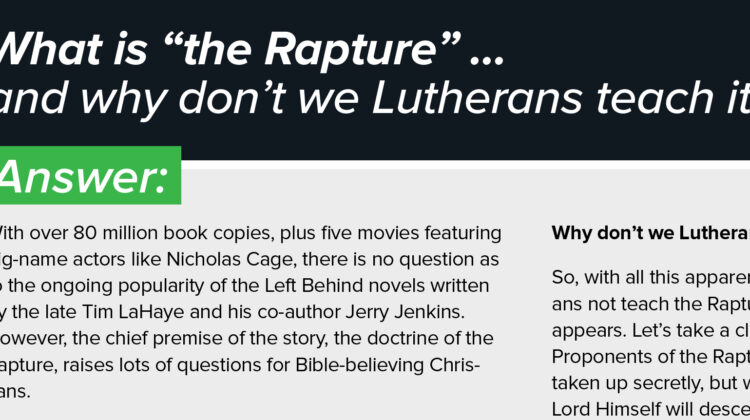
Question: What is “the Rapture” and why don’t we Lutherans teach it?
Answer: With over 80 million book copies, plus five movies featuring big-name actors like Nicholas Cage, there is no question as to the ongoing popularity of the Left Behind novels written by the late Tim LaHaye and his co-author Jerry Jenkins. However, the chief premise of the story, the doctrine of the Rapture, raises lots of questions for Bible-believing Christians.
What is the Rapture?
The Rapture is a chief tenet of dispensationalism, a relatively new teaching in the church initially popularized in the 1830s by a man named John Nelson Darby. In the 1860s, Darby’s teachings found their way to America, where they received support from evangelists like Dwight Moody. Throughout the 20th century, the influence of dispensationalism and the Rapture continued to grow. In more recent times, dispensationalist theology has entered American homes through the popular writings of authors like Hal Lindsey (The Late Great Planet Earth) and LaHaye’s and Jenkins’ Left Behind series.
Dispensationalists believe that Christ will return to earth prior to the final judgment and reign on earth for one thousand years (millennialism). Yet before Christ returns, the world will endure seven years of great tribulation. In order to spare believers from suffering the coming tribulation, dispensationalists teach that the believers will be suddenly and quietly “caught up”, i.e., raptured, from the earth to meet Jesus in the air. They cite 1 Thessalonians 4:16-17 as proof of this secret Rapture:
For the Lord Himself will descend from heaven with a shout, with the voice of an archangel, and with the trumpet of God. And the dead in Christ will rise first. Then we who are alive and remain shall be caught up together with them in the clouds to meet the Lord in the air. And thus we shall always be with the Lord. (NKJV, italics added)
Dispensationalists will also use Jesus’ words from Luke 17:34-36 as further evidence for the Rapture:
“I tell you, in that night there will be two men in one bed: the one will be taken and the other will be left. Two women will be grinding together: the one will be taken and the other left. Two men will be in the field: the one will be taken and the other left.”
In the dispensationalist way of thinking, those who are “taken” are the raptured believers, while those who are “left” are unbelievers who must endure the seven-year tribulation prior to Jesus’ return and thousand-year reign.
Why don’t we Lutherans teach the Rapture?
So, with all this apparent Scriptural support, why do Lutherans not teach the Rapture? Because not everything is as it appears. Let’s take a closer look at 1 Thessalonians 4:16-17. Proponents of the Rapture argue that the believers will be taken up secretly, but what does the passage say? “For the Lord Himself will descend from heaven with a shout, with the voice of an archangel, and with the trumpet of God” (italics added). Where is Christ’s coming described as secret? According to St. Paul, Christ’s second coming will be just the opposite, announced with shouts and trumpets! A look at the entire chapter tells us that the rapturing spoken of here is not some secret second coming, but the resurrection of the dead on the last day.
The wider context of Scripture also helps us rightly understand Jesus’ words in Luke 17. Earlier in the chapter, Jesus describes the swift arrival of God’s judgment when Noah built the ark and when Lot departed from Sodom. During those times, the people “ate, they drank, they bought, they sold, they planted, they built” (v. 28). They had no idea God’s judgment was coming until it was too late. Jesus says, “Even so will it be in the day when the Son of Man is revealed” (Luke 17:30). Jesus is not talking about some secret taking of the believers, but God’s swift surprise judgment against unbelievers.
The wild and fanciful ideas surrounding and underpinning the Rapture may make for good fiction, but in the end, that’s all they are: fiction. The sad reality is that faith in the Rapture relies on taking bits of God’s Word and interpreting them out of context. Moreover, proponents of the Rapture overlook the simple truth that we are already living in the end times. Even now, Christ reigns over this world from His place of power at the Father’s right hand, keeping us in His loving care. His glorious—and final—return can come at any moment. Rest assured, you won’t miss it!
-Pastor S. Piet Van Kampen